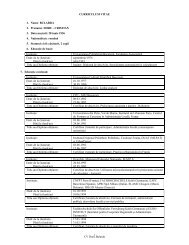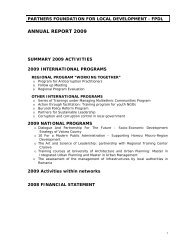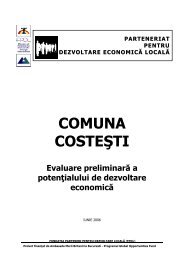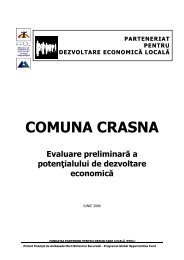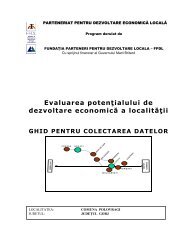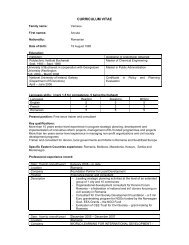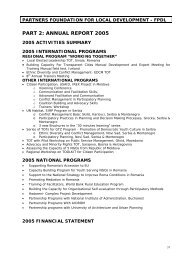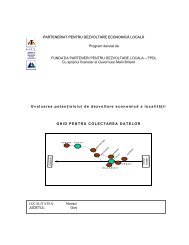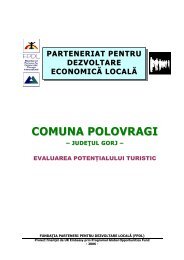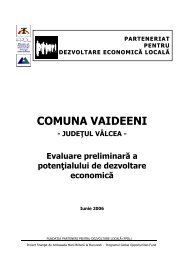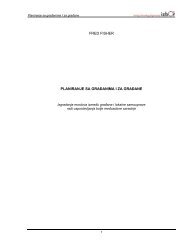Organizational Development: A Manual for Managers and ... - FPDL
Organizational Development: A Manual for Managers and ... - FPDL
Organizational Development: A Manual for Managers and ... - FPDL
You also want an ePaper? Increase the reach of your titles
YUMPU automatically turns print PDFs into web optimized ePapers that Google loves.
Competence requirements <strong>and</strong> evaluation<br />
There may be many criteria used <strong>for</strong> employment of the new staff, namely education, professional<br />
experience, political connections, family connections, unofficial payments etc. It seems hardly<br />
possible to find out the real criteria used <strong>for</strong> selection of personnel during the interviews. There<strong>for</strong>e<br />
the auditor should focus on the official procedure of recruitment, <strong>and</strong> try to find supporting<br />
evidence of functioning or not functioning of this system.<br />
Thus, if we find out that the staff is recruited using only competence criteria, we should ask where<br />
competence requirements are defined, who defines the competence requirements, how<br />
competence is evaluated. Is everybody meeting these requirements, if not why? Using this<br />
questioning technique we can find some other criteria existing, <strong>for</strong> example, somebody works<br />
because there is only one year left until the retirement, <strong>and</strong> even if he/she does not meet official<br />
requirements nobody even thinks about making him/her redundant.<br />
Again it should be stressed that the auditors are not judging the system of recruitment but simply<br />
stating the fact that there are certain criteria, which are not always employed <strong>for</strong> selection,<br />
preferably by showing examples of it.<br />
Training<br />
Training <strong>and</strong> qualification improvement of the local administration staff may be regulated at several<br />
stages:<br />
• By laws <strong>and</strong> state programs (directed at all civil servants);<br />
• Local administration procedures;<br />
• Order <strong>for</strong> internal training set by the subdivisions of the local government.<br />
During the interview the auditor should make clear that the training is understood both as in-house<br />
training <strong>and</strong> training provided by the outside organizations.<br />
At first the auditor should ask if the interviewee is receiving training herself/himself.<br />
If yes, then ask to specify what kind of training, who decided that training was needed, was it<br />
satisfactorily, how the employee herself/himself thinks what additional training he needs.<br />
If no, then why: he does not need any training, the chief thinks that no training is needed, there is<br />
no money <strong>for</strong> trainings, <strong>and</strong> nobody cares about training or some other reason.<br />
The heads of departments are asked to describe how training needs of their subordinates are<br />
identified, trainings planned <strong>and</strong> implemented <strong>and</strong> how the results of the trainings are evaluated.<br />
Resources<br />
<strong>Organizational</strong> structures <strong>and</strong> procedures <strong>and</strong> qualification of the personnel are the main factors<br />
influencing the expenses part of the efficiency of the administration. In the framework of these<br />
recommendations <strong>and</strong> at current state of their development we assume that all current expenses<br />
are "normal" in the context of the corresponding cultural enviroment <strong>and</strong> conditions of the market.<br />
I.e. everywhere in the world the educated people are writing their letters on their computers, but<br />
not everywhere the educated people are working in the local governments. Expensive buildings<br />
<strong>and</strong> rooms might be used because of tradition, even if they are not needed <strong>for</strong> the scope <strong>and</strong><br />
character of activities.<br />
We assume that wages <strong>and</strong> salaries together with social security <strong>for</strong> employees are adequate <strong>and</strong><br />
allow employing qualified personnel; that the number of employees in each department is<br />
adequate to the number needed; that the are enough computers – not less <strong>and</strong> not more that<br />
needed; that heating system in the building of local administration is economical.<br />
188



